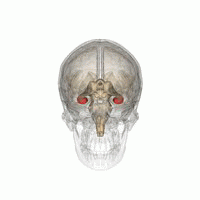
Cognitive neuroscience is the scientific field that is concerned with the study of the biological processes and aspects that underlie cognition, with a specific focus on the neural connections in the brain which are involved in mental processes. It addresses the questions of how cognitive activities are affected or controlled by neural circuits in the brain. Cognitive neuroscience is a branch of both neuroscience and psychology, overlapping with disciplines such as behavioral neuroscience, cognitive psychology, physiological psychology and affective neuroscience. Cognitive neuroscience relies upon theories in cognitive science coupled with evidence from neurobiology, and computational modeling.
Mindfulness is the cognitive skill, usually developed through meditation, of sustaining meta-attention of the contents of one's own mind in the present moment. Mindfulness derives from sati, a significant element of Hindu and Buddhist traditions, and is based on Zen, Vipassanā, and Tibetan meditation techniques. Though definitions and techniques of mindfulness are wide-ranging, Buddhist traditions describe what constitutes mindfulness such as how past, present and future moments arise and cease as momentary sense impressions and mental phenomena. Individuals who have contributed to the popularity of mindfulness in the modern Western context include Thích Nhất Hạnh, Joseph Goldstein, Herbert Benson, Jon Kabat-Zinn, and Richard J. Davidson.
Music psychology, or the psychology of music, may be regarded as a branch of both psychology and musicology. It aims to explain and understand musical behaviour and experience, including the processes through which music is perceived, created, responded to, and incorporated into everyday life. Modern music psychology is primarily empirical; its knowledge tends to advance on the basis of interpretations of data collected by systematic observation of and interaction with human participants. Music psychology is a field of research with practical relevance for many areas, including music performance, composition, education, criticism, and therapy, as well as investigations of human attitude, skill, performance, intelligence, creativity, and social behavior.

The psychological and physiological effects of meditation have been studied. In recent years, studies of meditation have increasingly involved the use of modern instruments, such as fMRI and EEG, which are able to observe brain physiology and neural activity in living subjects, either during the act of meditation itself or before and after meditation. Correlations can thus be established between meditative practices and brain structure or function.

Helen J. Neville was a Canadian psychologist and neuroscientist known internationally for her research in the field of human brain development.
Guided imagery is a mind-body intervention by which a trained practitioner or teacher helps a participant or patient to evoke and generate mental images that simulate or recreate the sensory perception of sights, sounds, tastes, smells, movements, and images associated with touch, such as texture, temperature, and pressure, as well as imaginative or mental content that the participant or patient experiences as defying conventional sensory categories, and that may precipitate strong emotions or feelings in the absence of the stimuli to which correlating sensory receptors are receptive.
Working memory training is intended to improve a person's working memory. Working memory is a central intellectual faculty, linked to IQ, ageing, and mental health. It has been claimed that working memory training programs are effective means, both for treating specific medical conditions associated with working memory deficit, as and for general increase in cognitive capacity among healthy neurotypical adults.
Mindfulness-based stress reduction (MBSR) is an eight-week evidence-based program that offers secular, intensive mindfulness training to assist people with stress, anxiety, depression and pain. Developed at the University of Massachusetts Medical Center in the 1970s by Professor Jon Kabat-Zinn, MBSR uses a combination of mindfulness meditation, body awareness, yoga and exploration of patterns of behavior, thinking, feeling and action. Mindfulness can be understood as the non-judgmental acceptance and investigation of present experience, including body sensations, internal mental states, thoughts, emotions, impulses and memories, in order to reduce suffering or distress and to increase well-being. Mindfulness meditation is a method by which attention skills are cultivated, emotional regulation is developed, and rumination and worry are significantly reduced. During the past decades, mindfulness meditation has been the subject of more controlled clinical research, which suggests its potential beneficial effects for mental health, athletic performance, as well as physical health. While MBSR has its roots in wisdom teachings of Zen Buddhism, Hatha Yoga, Vipassana and Advaita Vedanta, the program itself is secular. The MBSR program is described in detail in Kabat-Zinn's 1990 book Full Catastrophe Living.
Philip David Zelazo is a developmental psychologist and neuroscientist. His research has helped shape the field of developmental cognitive neuroscience regarding the development of executive function.

Memory improvement is the act of enhancing one's memory. Research on improving memory is driven by amnesia, age-related memory loss, and people’s desire to enhance their memory. Research involved in memory improvement has also worked to determine what factors influence memory and cognition. There are many different techniques to improve memory some of which include cognitive training, psychopharmacology, diet, stress management, and exercise. Each technique can improve memory in different ways.

Tania Singer is a German psychologist and social neuroscientist and the scientific director of the Max Planck Society's Social Neuroscience Lab in Berlin, Germany. Between 2007 and 2010, she became the inaugural chair of social neuroscience and neuroeconomics at the University of Zurich and was the co-director of the Laboratory for Social and Neural Systems Research in Zurich. Her research focuses on the developmental, neuronal, and hormonal mechanisms underlying human social behavior and social emotions such as compassion and empathy. She is founder and principal investigator of the ReSource project, one of the largest longitudinal studies on the effects of mental training on brain plasticity as well as mental and physical health, co-funded by the European Research Council. She also collaborates with the macro-economist Dennis Snower on research on caring economics. Singer's Caring Economics: Conversations on Altruism and Compassion, Between Scientists, Economists, and the Dalai Lama was published in 2015. She is the daughter of the neuroscientist Wolf Singer.

Attentional control, colloquially referred to as concentration, refers to an individual's capacity to choose what they pay attention to and what they ignore. It is also known as endogenous attention or executive attention. In lay terms, attentional control can be described as an individual's ability to concentrate. Primarily mediated by the frontal areas of the brain including the anterior cingulate cortex, attentional control and attentional shifting are thought to be closely related to other executive functions such as working memory.
NeuroRacer is a video game designed by a team of researchers at the University of California, San Francisco led by Adam Gazzaley as a way to help with mental cognition. It was designed as an "Adam Gazzaley intervention" for "top-down modulation deficits in older adults." A study on 60- to 85-year-olds showed that the multitasking nature of the game caused improvements in tasks outside of the game involving working memory and sustained attention. The game is presented as a driving simulator. Gameplay involves driving a vehicle down windy roads and pushing buttons when a sign appears.
Contemplative neuroscience is an emerging field of research that focuses on the changes within the mind, brain, and body as a result of contemplative practices, such as mindfulness-based meditation, samatha meditation, dream yoga, yoga nidra, tai chi or yoga. The science is interdisciplinary and attempts to clarify such mind-brain-body changes across emotional, behavioral, cognitive, and perceptual domains with an emphasis for relating such changes to neurobiology and first-person experience. It often emphasizes Buddhist approaches to contemplation and meditation, and conflates meditation with various contemplative practices. Founders of the field include Richard Davidson, Francisco Varela and B. Alan Wallace, among others.

Adam Gazzaley is an American neuroscientist, author, photographer, entrepreneur and inventor. He is the founder and executive director of Neuroscape and the David Dolby Distinguished Professor of Neurology, Physiology, and Psychiatry at University of California, San Francisco (UCSF). He is co-founder and chief science advisor of Akili Interactive Labs and JAZZ Venture Partners. Gazzaley is the inventor of the first video game approved by the FDA as a medical treatment. He is a board of trustee member, science council member and fellow of the California Academy of Sciences. He has authored over 180 scientific articles.
Catherine Kerr was an Assistant Professor of medicine, Assistant Professor of family medicine, and the Director of Translational Neuroscience in the Contemplative Studies Initiative at Brown University at her untimely death in November, 2016. Kerr received her bachelor's from Amherst College before completing her Ph.D. at Johns Hopkins University. Following this she was a post doctoral fellow and Instructor at Harvard Medical School, and it was here that she received a career development award from the NIH to conduct research into the cognitive neuroscience of meditation. She joined Brown's Department of Family Medicine and Contemplative Studies Initiative in 2011.
Mindfulness and technology is a movement in research and design, that encourages the user to become aware of the present moment, rather than losing oneself in a technological device. This field encompasses multidisciplinary participation between design, psychology, computer science, and religion. Mindfulness stems from Buddhist meditation practices and refers to the awareness that arises through paying attention on purpose in the present moment, and in a non-judgmental mindset. In the field of Human-Computer Interaction, research is being done on Techno-spirituality — the study of how technology can facilitate feelings of awe, wonder, transcendence, and mindfulness and on Slow design, which facilitates self-reflection. The excessive use of personal devices, such as smartphones and laptops, can lead to the deterioration of mental and physical health. This area focuses on redesigning and creating technology to improve the wellbeing of its users.

Judson Alyn Brewer is an American psychiatrist, neuroscientist and author. He studies the neural mechanisms of mindfulness using standard and real-time fMRI, and has translated research findings into programs to treat addictions. Brewer founded MindSciences, Inc., an app-based digital therapeutic treatment program for anxiety, overeating, and smoking. He is director of research and innovation at Brown University's Mindfulness Center and associate professor in behavioral and social sciences in the Brown School of Public Health, and in psychiatry at Brown's Warren Alpert Medical School.
Mindfulness-based pain management (MBPM) is a mindfulness-based intervention (MBI) providing specific applications for people living with chronic pain and illness. Adapting the core concepts and practices of mindfulness-based stress reduction (MBSR) and mindfulness-based cognitive therapy (MBCT), MBPM includes a distinctive emphasis on the practice of 'loving-kindness', and has been seen as sensitive to concerns about removing mindfulness teaching from its original ethical framework. It was developed by Vidyamala Burch and is delivered through the programs of Breathworks. It has been subject to a range of clinical studies demonstrating its effectiveness.
Ruchika Shaurya Prakash is an American psychologist who is a professor at Ohio State University. She is Director of the Center for Cognitive and Behavioral Brain Imaging. Prakash was awarded the American Psychological Association Early Career Achievement Award in 2016. She delivered online webinars on resilience and mindfulness throughout the COVID-19 pandemic.









